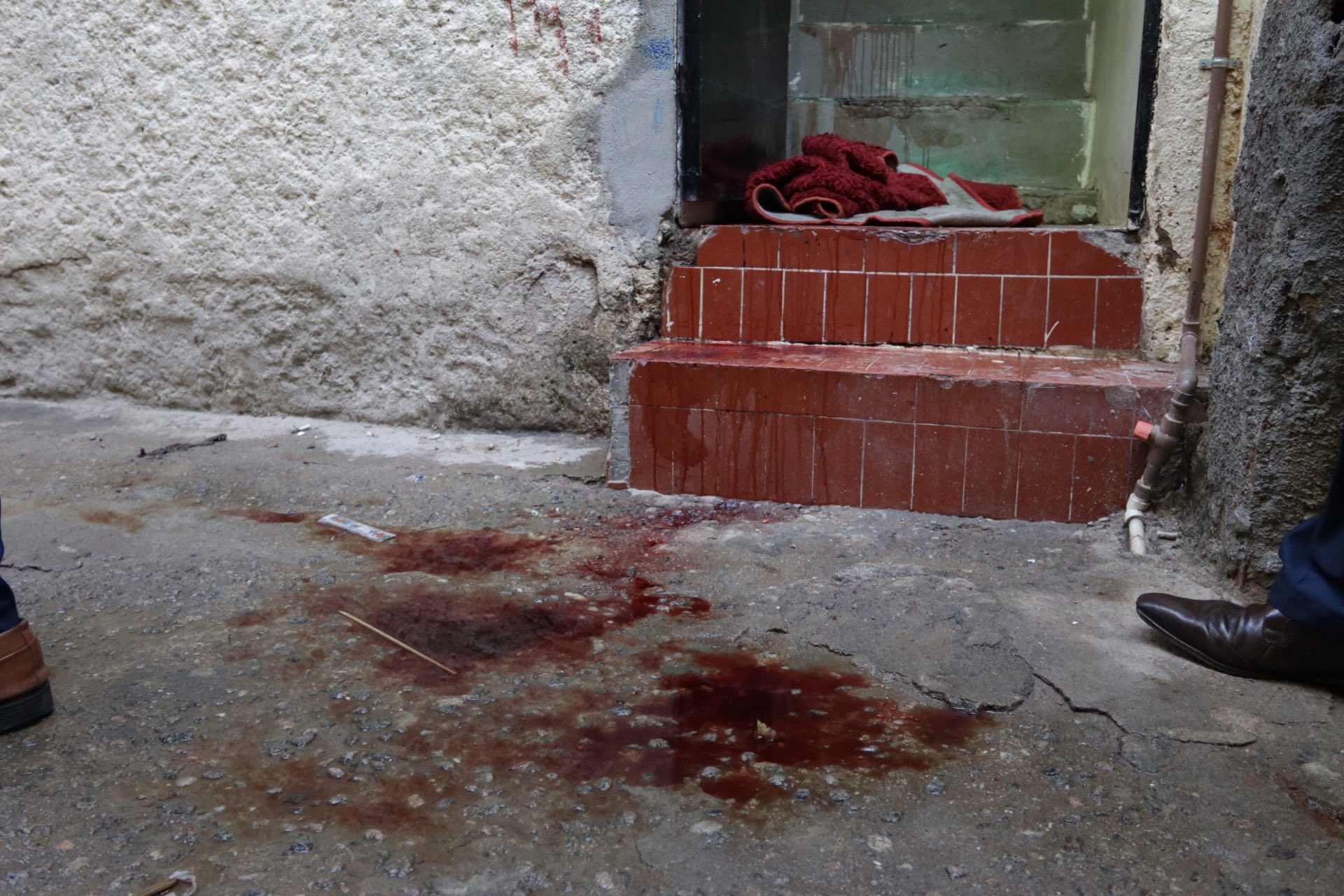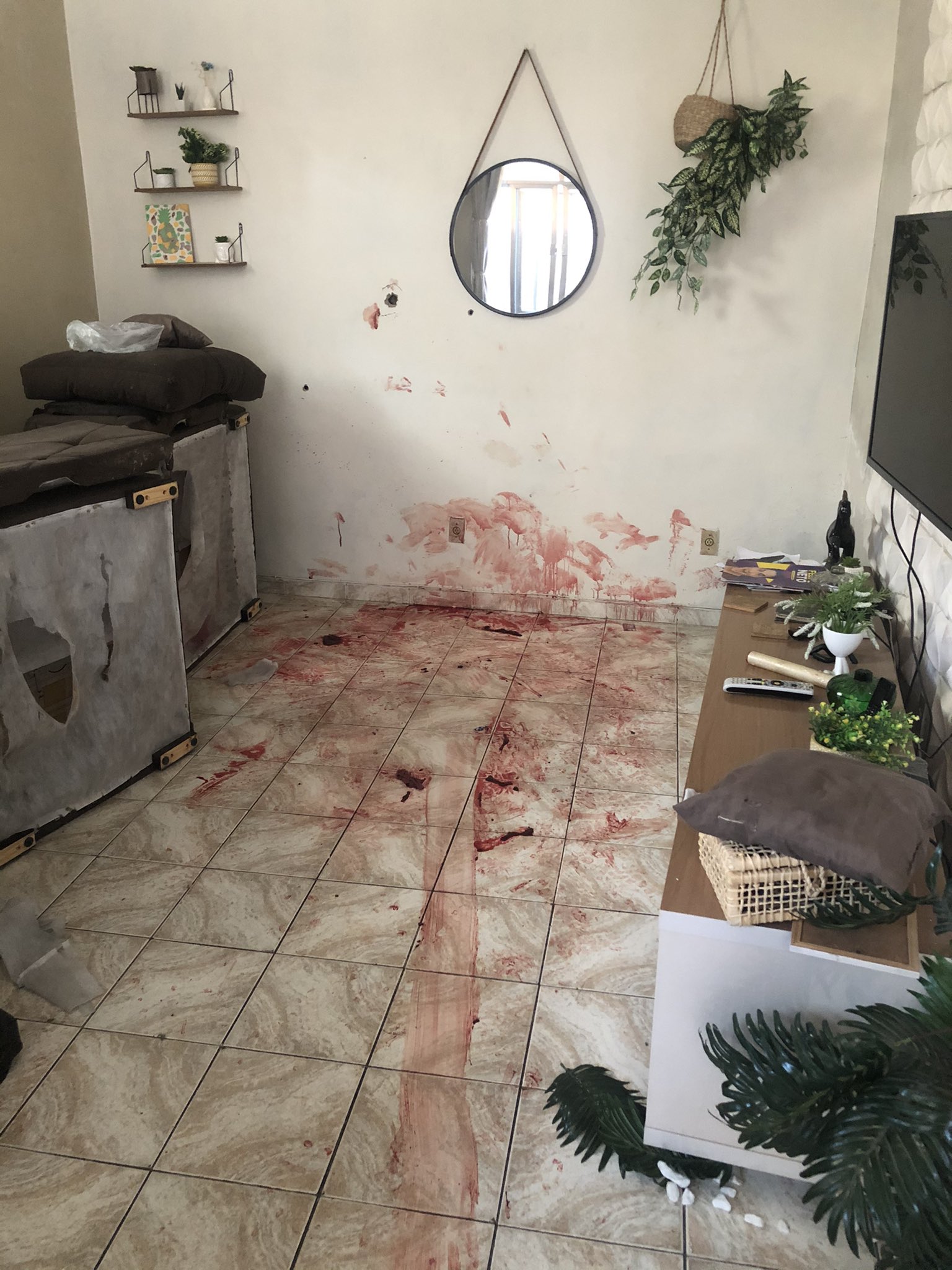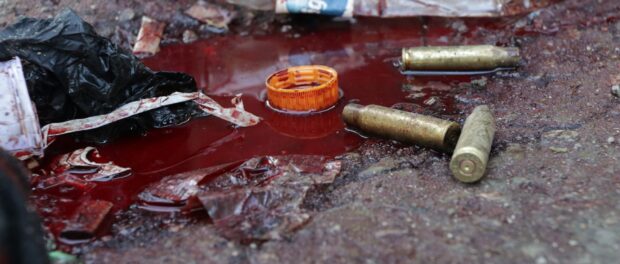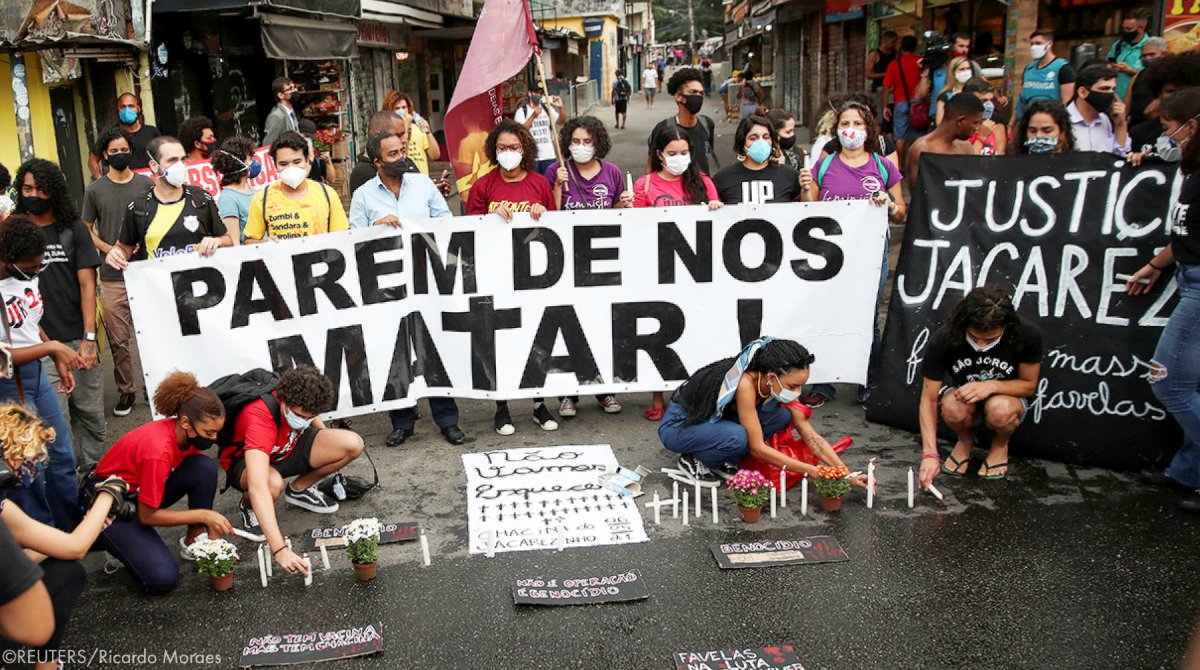
This article is part of RioOnWatch’s #VoicesFromSocialMedia series, which compiles perspectives posted on social media by favela residents and activists about events and societal themes that arise.
In broad daylight, broadcasted by media channels, Rio de Janeiro’s Civil Police kills 24 people in Jacarezinho, the capital’s blackest favela.
It’s May 6, 2021 in Rio de Janeiro. Teams from the Civil Police’s Special Resources Coordination (CORE) start a police operation in the Jacarezinho favela, in the North Zone. It was nine in the morning when the Jacarezinho Audiovisual Lab (LabJaca), informed: “Today Jacarezinho woke up under gunfire, like we hadn’t in a long time. Three people have been shot until now, a civil policeman and two workers who were on the metro.” LabJaca requests: “Residents, stay tuned! Our safety comes first!” Through social media, residents of the community reported: “We are stuck inside our homes, unable to breathe with the pepper bombs, with no way of getting out,” while an armored helicopter—known as the “flying caveirão,” an air version of the civil police’s armored trucks—flies over a sea of brick homes. It was the onset of the Exceptis Operation.
According to the Civil Police, the Exceptis Operation took place due to investigations that pointed to children and teenagers in the region being recruited by the drug traffic to join the faction that dominates the territory.
Hoje o Jacarezinho acordou debaixo de tiros, como não se via há muito tempo.
São três baleados até o momento, um policial civil e dois trabalhadores que estavam no metrô.
🚨Fica liga morador! Nossa proteção em primeiro lugar! 🚨 pic.twitter.com/FyEmwRvtvg
— LabJaca (@LabJaca) May 6, 2021
Today Jacarezinho woke up under gunfire, like we hadn’t in a long time.
Three people have been shot until now, a civil policeman and two workers who were on the metro.
Residents, stay tuned! Our safety comes first!
This was just the start of the savagery, and of a day of terror for Jacarezinhos’s 37,000 residents—estimated population, according to the municipal administration. Throughout the day, the number of wounded and dead climbed alarmingly. By noon, the police had already confirmed 15 dead. At 1:04pm, with human rights organizations on site, another update increased the figures of the carnage.
29 people were shot during Jacarezinho’s police operation, among which were three civil policemen, with 25 of them being killed: 24 civilians and one policeman in the most lethal incursion of state security agents to have occurred in the history of Rio de Janeiro, according to survey from the Fluminense Federal University’s (UFF) Group of Studies on the New Illegalities (Geni) and platform Fogo Cruzado. The operation lasted over seven hours.
Hit during the operation, civil police officer André Farias, 45, was taken to Salgado Filho Hospital, in Méier, but did not make it. Among those shot inside the Jacarezinho favela during the police intervention, he was the only one taken away to receive medical attention.
The violence of the operation caught up with two passengers who were on a northbound line 2 metro train that cuts the Jacarezinho favela between the Maria da Graça and Triagem stations. Rafael Silva, 33, and Humberto Gomes Duarte, 20, were hit by stray bullets during the police raid. According to information released by the Municipal Health Secretariat, Rafael was taken to the Salgado Filho Hospital and left the unit of his own accord. Humberto was taken to the Souza Aguiar Municipal Hospital, in Central Rio, and is in stable condition.
Operation Exceptis happened three weeks after the public hearing held by the Brazilian Supreme Court (STF), regarding ADPF 635, which aims to produce strategies to reduce the lethality in favelas during police operations in Rio de Janeiro. At the April 19 hearing, more than 100 organizations were consulted, including residents belonging to favela grassroots movements and mothers of victims of State violence—who were heard as “friends of the court”—besides human rights entities and public security specialists, with the Fogo Cruzado Institute among them.

“We’ve been monitoring police operations in Jacarezinho for the past five years. Unfortunately, there’s a history of extremely violent interventions taking place there, particularly after policemen have been killed, which classifies them as vengeance operations. Ever since Fogo Cruzado started to monitor the data, we have recorded 269 shootouts in Jacarezinho, with 68 dead and 67 wounded,” says Maria Isabel Couto, Fogo Cruzado Institute’s Director of Programs.
According to data analyzed by Couto, in five years, although police operations represent 35% of the place’s total shootouts, of the 68 deaths, 60 officially occurred through the action of State security agents, which equals 88% of those who have died by firearms. Among the total wounded, the police were responsible for 85% of cases.
“The population of Jacarezinho has historically suffered with violent police raids that leave indefensible scars in the number of dead and wounded. But it’s not just the dead and wounded we need to be looking at. An entire population is being subjected to the violence of these operations. Today, there’s a resident who can’t leave home to get married. Another one, pregnant, had a C-section scheduled and couldn’t go. So, we have a baby who is ready to be born and who’s already suffering all this violence,” Couto points out.
As attested by researcher Terine Husek Coelho, who analyzed data from the Public Security Institute (ISP) between January 2010 and December 2015—if the number of law enforcement officer deaths increases in a given location, the probability of homicides occurring against citizens in the same locality immediately increases by: 1150% for the same day; by 350% for the next day, and by 125% between five and seven days following the death of a police officer.
Ver essa foto no Instagram
Massacre in the Jacarezinho Favela
Less than three weeks after the hearing at the Federal Supreme Court (STF) about police operations in Rio de Janeiro, the population of Jacarezinho wakes up to a massive raid by the Civil Police and supported by the Military Police. To this moment, 22 people have been killed.
In an article published by LabJaca, Pedro Paulo, a researcher for the Center of Studies of Security and Citizenship (CESeC) and for LabJaca, ponders that “the data illustrate a knowledge that the resident of Jacarezinho and of other favelas already has. In 2017 and 2018, respectively, when an officer from the Civil Police’s Special Resources Coordination (CORE) died in another operation like today’s, and a police chief was found dead in the vicinity of the favela, the Civil Police carried out two weeks of vengeance-operations in Jacarezinho.”
For Fogo Cruzado’s Couto, whether the Civil Police notified the Public Prosecutor’s Office or not regarding the operation—as is provided for by ADFP 635, that bans police interventions in favelas, barring exceptional circumstances—this Thursday’s operation in Jacarezinho is a clear example of what the agents of the State should not do.

“There is no way you can call an operation with 25 dead a success. It is extremely important that the ADFP decision is not regarded as a mere technical limitation. Its objective is not to simply prevent operations, but to rethink the model of public security, not only in Rio de Janeiro, but in all of Brazil. There is this faulty concept of what public security is. The rule of law is linked to the use of force, but you can’t do justice with your own hands. The legacy of the police is to protect, not to kill,” reflects Couto.
“Police forces exist to guarantee our lives; our safety is a constitutional right. The moment that the actions of these agents cause even more death and violence, it is clear that the model is wrong,” she analyzes. Fogo Cruzado data show that, last year, 25% of the deaths in Rio de Janeiro were caused by police interventions.
Governador @claudiocastroRJ acontece um massacre na favela do Jacarezinho hoje. Segundo relatos, já são 25 mortos. É preciso que a operação policial seja interrompida imediatamente! Exigimos que a determinação do @STF que suspende operações seja respeitada. #chacinadojacarezinho
— Observatório de Favelas (@defavelas) May 6, 2021
Governor @claudiocastroRJ there is a massacre happening in the Jacarezinho favela today. According to reports, 25 are already dead. The police operation needs to be interrupted immediately! We demand that the @STF decision suspending operations be respected. #jacarezinhomassacre
The STF’s decision of suspending police operations in Rio’s favelas during the coronavirus pandemic does not stop law enforcement officers from raiding favelas. The number of people who have fallen victim to these invasions violates the “ADPF das Favelas,” as the ruling came to be known. According to the Civil Police, the Public Prosecutor’s Office was notified when the operation was already underway.
Voices From Social Media: #JacarezinhoMassacre
Throughout the entire day, residents’ reports through social media or WhatsApp exposed the state of vulnerability, panic and fear in Jacarezinho. Maria*, told RioOnWatch: “They’re all inside one same house. They want to turn themselves in, but the police are killing.” João*, reported that homes were being invaded and that the police were “knifing people to death.”
With the arrival of members of the State Legislative Assembly’s (Alerj) Human Rights Commission and of the Brazilian Bar Association (OAB) in the favela, plus community newspapers, images and more reports of human rights violations flooded social media. Voz das Comunidades published images with blood trails left in various parts of Jacarezinho.
Casas invadidas. Moradores agredidos. Policiais confiscando telefones da população local. Muitos projéteis pelo chão. Ao menos 25 mortes devido à operação policial nesta quinta-feira (6) no Jacarezinho, no Rio. #ChacinaDoJacarezinho pic.twitter.com/G7AE8d5T7r
— Voz das Comunidades (@vozdacomunidade) May 6, 2021
Homes invaded. Residents assaulted. Police confiscating phones from the local population. Many bullets on the floor. At least 25 deaths brought on by the police operation this Thursday (6) in Jacarezinho, in Rio.
Medical doctor Nayara Rocha wrote a post criticizing the operation and, like her, residents stressed how the favela population, in the middle of the pandemic, has to coexist with a policy of death management—the death of those considered “killable”—by the State.
Ou morre de vírus, ou de fome ou de tiro. Favelado não tem escolha. O Estado é cruel, é GENOCIDA! https://t.co/qYeg511zet
— Nayara Rocha (@naymdarocha) May 6, 2021
You either die from the virus, or from hunger or from a bullet. Favelados have no choice. The State is cruel. It’s GENOCIDAL!
O Jacarezinho passa fome, altos números de casos de covid, uns dos maiores focos de tuberculose NO PAÍS, um dos piores índices de desenvolvimento humano do estado e sofre hoje a maior chacina cometida em operações policiais. Estamos devastados. #ChacinaDoJacarezinho
— Bianca Peçanha (@biancatpe) May 6, 2021
Jacarezinho is hungry, number of Covid cases soar, it’s one of the biggest hotspots for tuberculosis IN THE COUNTRY, it has one of the worse HDIs in the state, and today it’s suffering the greatest massacre ever committed by a police operation. We are devastated. #JacarezinhoMassacre
Não existe fique em casa quando a morte sai de um fuzil e entra na tua casa. A #chacinajacarezinho é um retrato do Brasil real, no Brasil onde a democracia não chegou, onde o estado de direito é uma ilusão.
“no tiroteio, toda bala perdida tem um alvo” (Finado Invasor). É foda.
— Geysson Santos (@geyssons) May 6, 2021
There’s no “Stay Home” when death comes out of a rifle and into your house. The #jacarezinhomassacre is a portrait of the real Brazil, the Brazil where democracy hasn’t arrived, where the rule of law is an illusion.
“in a shootout, every stray bullet has a target” (The Late Invader). It sucks.
The Marielle Franco Institute wrote a post denouncing the media’s bias by correcting the headline of a piece published by news portal G1.
Mais uma vez, grandes portais de comunicação ocultando o extermínio da população negra, pobre e favelada. Chega de normalizar o massacre! #ChacinaDoJacarezinho pic.twitter.com/0h1MLnLMrG
— Instituto Marielle Franco (@inst_marielle) May 6, 2021
Once again, large communication portals hide the extermination of the black, poor, favela population. Enough with normalizing the massacre! #JacarezinhoMassacre
Headline corrected by the Institute: “Operation in Rio ends with one police officer and 22 suspects dead” to read “Illegal operation in Rio ends with one police officer and 22 people murdered”
A Capital Scarred by Massacres and Human Rights Violations
Dozens of reports on human rights violations were denounced on the Internet by Jacarezinho residents. OAB-RJ’s Commission for Human Rights and Legal Assistance and Rio’s Public Defender’s Office went to the neighborhood early in the afternoon on Thursday, May 6. One of the most startling complaints brought to the attention of the Commission was a photograph showing the body of a black person, placed in a chair, with one of their fingers inside the mouth, as if in a mocking gesture. According to the Commission’s representative, the charges are serious and the person responsible may have been an agent of the State.
Barbárie: após a operação policial no Jacarezinho, o corpo de uma pessoa negra foi posto numa cadeira, sentado, com um dos seus dedos na boca, em posição de deboche.
E o corpo está lá, para que todas e todos vejam!
Debocham da decisão do STF que suspendeu operações policiais!— Djeff Amadeus (@AmadeusDjeff) May 6, 2021
Atrocity: after the Jacarezinho police operation, the body of a black person was put in a chair, sitting down, with one of their fingers in their mouth, in an expression of mockery. And the body is there, for everyone to see! They are mocking the STF’s decision of suspending all police operations!
The Rio de Janeiro Public Defender’s Office informed that the case is being followed closely through its Office of the Ombudsman and its Human Rights Defense Center. They met with residents about the circumstances of the operation in order to evaluate the individual and collective measures to be adopted. “From the outset, we would like to manifest our deepest regret and solidarity to the families of all the victims of yet another tragedy to befall our state,” wrote the Office of the Ombudsman in a statement.
Cecília Oliveira, journalist from The Intercept, published that an 8-year-old child witnessed an execution.
“Um rapaz foi executado no quarto de uma menina de oito anos. A cama dessa criança estava lotada de sangue, inclusive a coberta que ela usa. Essa criança está completamente traumatizada”, disse defensora pública Maria Júlia Miranda. #ChacinaDoJacarezinho
— Cecília Olliveira (@Cecillia) May 6, 2021
“A young man was executed inside the bedroom of an 8-year-old-girl. This child’s bed was soaked in blood, including the blanket she covers herself with. This child is completely traumatized,” said public defender Maria Júlia Miranda #JacarezinhoMassacre
State deputy Renata Souza, president of Alerj’s Human Rights and Citizenship Commission, spoke up against the Jacarezinho massacre in the plenary session of the State Legislative, emphasizing that the Rio de Janeiro Civil Police cannot administer the death penalty.
Não temos pena de morte no Brasil!
A polícia não tem que definir quem deve morrer e viver na nossa sociedade! Hoje temos uma chacina ocorrendo no Jacarezinho e ela precisa ser investigada!#ChacinadoJacarezinho pic.twitter.com/VYycFt0UZ7
— Renata Souza (@renatasouzario) May 6, 2021
We don’t have a death penalty in Brazil!
The police shouldn’t be able to define who should die and who should live in our society! Today we have a massacre happening in Jacarezinho and it needs to be investigated! #JacarezinhoMassacre,
She also called governor Claudio Castro to ask about the circumstances under which the Civil Police’s Exceptis Operation was created. Castro told the deputy that he will ask that the police provide him with a thorough report. The deputy wants to know if the operation followed protocol regarding cases of exception to STF’s ban on police operations during the pandemic. She will also request information on the autopsy reports. The governor informed the deputy that he will request a thorough report on the operation from the Civil Police.
“In the midst of the pandemic, with the abject need that the favela population is already facing, it is not reasonable to aggravate matters by putting a community through all of this violence, especially considering the STF’s current decision to suspend police operations in favelas,” said Renata Souza. “No one here is questioning the need to investigate and to hold accountable those who promote armed criminality in favela territories, but police intelligence needs to evolve into methods, strategies and actions that do not expose the community to horror, and to the risk of death during an operation such as this one,” she concluded.
According to the state legislature’s press office, seven of Rio de Janeiro’s state deputies will file a complaint with the Public Prosecutor’s Office, with the Federal Supreme Court, with the UN and the OAS against the human rights violations that happened during Rio de Janeiro Civil Police’s Exceptis Operation.
According to Fogo Cruzado’s violence data laboratory, since 2016, the Jacarezinho massacre has had the highest number of recorded victims (three or more) in the state, with 24 dead—of which 23 were considered suspects by the police and one was a civil police officer.
- Jacarezinho – police operation – 24 civilians dead + 1 civil police officer dead + 4 wounded (2 police)
- Feb 08, 2019 – Fallet/Prazeres – police operation – 13 civilians dead + 1 civilian wounded
- May 15 2020 – Complexo do Alemão – police operation – 13 civilians dead
- Oct 15 2020 – Vila Ibirapitanga (Itaguaí) – police operation – 12 civilians dead (including a former military police officer)
A report on the violations committed in the Jacarezinho favela was sent to the UN and to the OAS on Friday, May 7. Organizations request the guarantee to an independent investigation, conducted by someone other than the security forces involved in the operation.
The complaint filed by collectives Mothers of Manguinhos, Redes da Maré, Marielle Franco Institute, Straight Talk Collective, Conectas Human Rights and Global Justice, calls on the UN and the OAS to demand a position from the Brazilian State regarding the events, as well as a severe and independent investigation and a clear display defending basic rights.
In the morning of May 7, groups of mothers of victims of State violence and the March of the Favelas Movement protested at the entrance to the Jacarezinho community.
At nightfall, on May 6, Jacarezinho collectives, NGOs and associations released a public statement protesting the operation triggered by the Division for the Protection of Children and Adolescents (DPCA), with the support of the Civil Police’s Special Resources Coordination (CORE).
“What children does a person killed inside an 8-year-old child’s bedroom protect? What rights are being guaranteed? As if it weren’t enough that we’re dying from an illness for which a vaccine already exists, we also have to be put through a daily routine of brutal State-promoted violence. There is no other word for what happens in favelas and peripheries: what we live is a genocide of this country’s black population,” says the statement, also calling a public act for Friday, 5pm, in front of the Unidos do Jacarezinho Samba School court.

*Names are fictional in order to protect the identity of the residents.

